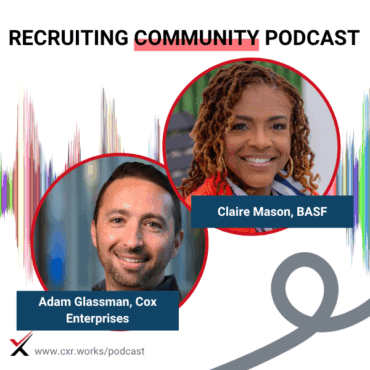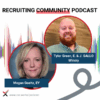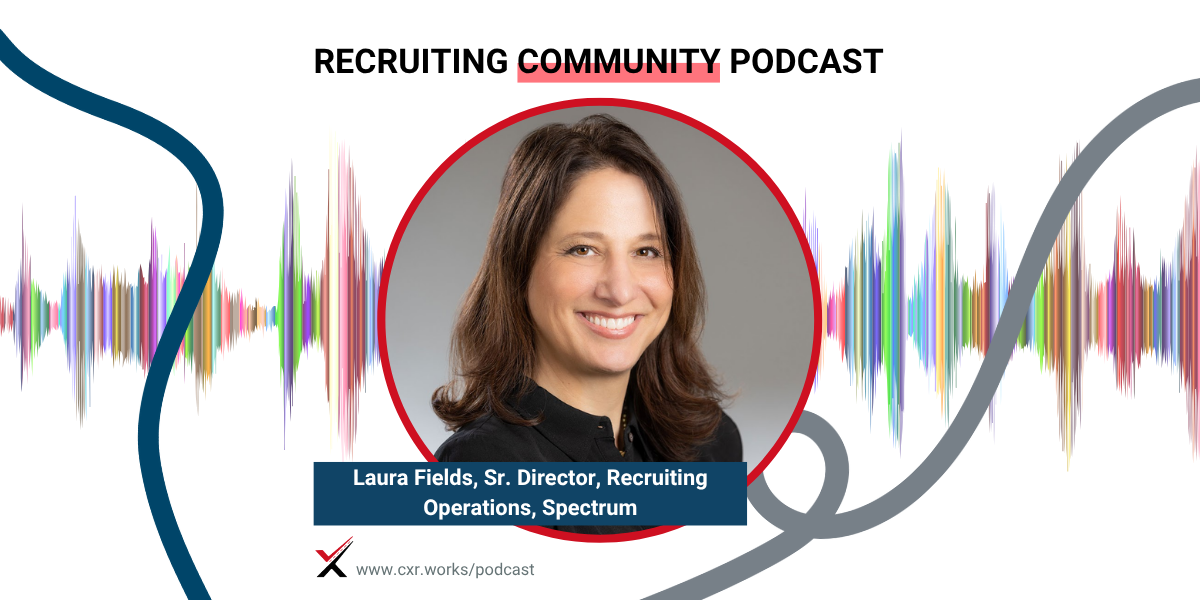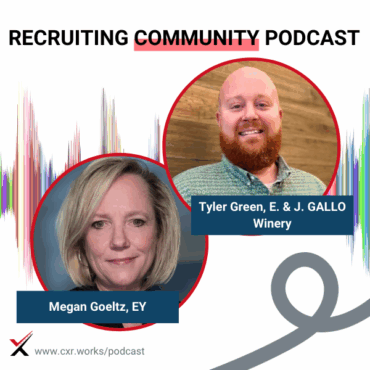
Takeaways from Q4 Research on Employer Branding
Is your employer brand strategy aligned with business goals? Claire Mason and Adam Glassman reveal insights from new research on what sets top organizations apart.
 play_arrow
play_arrow
20+ Years at Dell and Beyond: Jennifer Newbill’s Career Crossroads Cami Grace
 play_arrow
play_arrow
AI Interview Research Cami Grace
 play_arrow
play_arrow
Solutions Spotlight on Hackajob Cami Grace
 play_arrow
play_arrow
A Headhunter Changed Everything: Rob Daugherty’s Career Crossroads Cami Grace

Assessments are a crucial part of the hiring process, but let’s be honest—many candidates drop out when they hit that stage. In this episode, we sit down with Laura Fields, Senior Director of Talent Assessment at Spectrum, to explore the challenge of assessment-related drop-off rates and how companies can rethink their approach to improve engagement.
Laura shares fascinating insights from a recent retargeting campaign that successfully won back candidates who initially abandoned their applications. What messaging worked? What didn’t? And how did Spectrum dramatically reduce its assessment dropout rate? We break it all down in this episode, plus discuss the future of assessments, AI-driven hiring experiences, and what’s next for candidate engagement strategies.
[3:45] – Why candidates drop off at the assessment stage and how to keep them engaged
[7:20] – The impact of in-line assessments vs. delayed testing
[12:05] – Breaking down Spectrum’s retargeting campaign: What worked & what didn’t
[17:30] – The surprising email messaging that convinced candidates to return
[22:15] – The role of self-affirmation in candidate confidence and assessment completion
[27:40] – Future trends in assessments and candidate engagement strategies
[34:10] – How companies can test and optimize their own assessment outreach campaigns
If you found this conversation insightful, be sure to subscribe, rate, and leave a review! Follow us for more deep dives into candidate experience, assessments, and employer branding strategies. See you next time!
Title:
Assessments and Candidate Experience
Featured Guests:
Laura Fields, Talent Assessment Leader, Spectrum
Hosts:
Chris Hoyt, President, CareerXroads
Gerry Crispin, Co-Founder, CareerXroads
Episode Overview:
In this episode, Chris Hoyt and Gerry Crispin talk with Laura Fields from Spectrum about optimizing the candidate experience during the assessment stage. Laura shares how Spectrum significantly reduced assessment drop-off rates through in-line assessment integration and retargeting campaigns based on I/O psychology. The conversation covers experimental messaging strategies, candidate motivation, and the long-term potential for scaling these insights across high-volume hiring.
Key Topics:
Reducing candidate drop-off by integrating assessments with applications
Retargeting incomplete assessments with psychological intervention-based messaging
Success of self-affirmation prompts over job relevance and mindfulness
Stereotype threat and its impact on assessment performance
High-volume recruiting in call centers, sales, and retail roles
“Fit Finder” assessment for matching candidate preferences to open roles
Opportunities for collaboration and scaling across the CXR community
Notable Quotes:
“We saw withdrawal rates around 37–38% when assessments were delayed. Now they’re closer to 15–20%.” — Laura Fields
“The winner was self-affirmation… ‘You bring valuable skills. Keep your strengths in mind as you take the assessment—we want to see the best of you.’” — Laura Fields
“63% of the candidates who came back and completed the assessment were rated as ‘recommended’ or ‘highly recommended.’” — Laura Fields
“I believe in the power of assessments, and I don’t want fear or misunderstanding to get in the way of great talent.” — Laura Fields
Takeaways:
Spectrum’s approach to improving assessment completion shows the impact of thoughtful candidate communication grounded in psychology. Self-affirmation messaging significantly increased completion rates without sacrificing quality. These efforts demonstrate how data-informed candidate care can make hiring more equitable, especially in high-volume roles, and open doors for broader community collaboration.
Want more conversations like this?
Subscribe to the CXR podcast and explore how top talent leaders are shaping the future of recruiting. Learn more about the CareerXroads community at cxr.works.
Chris Hoyt: I know I’m gonna catch a lot of heat for this, Laura, but I’m just gonna say it: I didn’t like the Wicked movie. I didn’t like it.
Laura Fields: No, I don’t like Wicked the show. Why are there romance stories in this? I don’t understand. Nothing about the movie needed to be three hours. They just whittled it down to the women and what counts in that story.
Chris Hoyt: I love you. You have the take now. The bullets won’t come at me—they’ll come at you. This is great.
Laura Fields: I’m used to being riddled by bullets. That is my role.
Chris Hoyt: I saw it on Broadway, probably four times. The kids loved it. It was good. I enjoyed it. Idina Menzel, Kristin Chenoweth—I loved it the first time. It was okay the second, third, and fourth. But the movie? I really had a hard time with it.
Laura Fields: Three hours—for half of it, maybe.
Chris Hoyt: Yeah. I’m not a Grande fan either, maybe that’s part of it. Ever since the donut thing, I just can’t.
Laura Fields: I agree. I’ve held a grudge because of the donut thing.
Chris Hoyt: But you are a Broadway fan. A big Broadway fan.
Laura Fields: I am. In fact, on April 5th, I’m making a whirlwind trip—one day only. Flying up and flying back to see Orville Peck play the MC in Cabaret. I recently discovered him and want to see that. And Titus Burgess is going to be in Othello. That’s my plan.
Chris Hoyt: So you’re flying to New York, watching two shows, then flying home?
Laura Fields: That’s the best-case scenario. A lot could disrupt it. We’ll see.
Chris Hoyt: Definitely some wildcard issues there. Keep us posted.
Laura Fields: Will do.
Chris Hoyt: Alright, we’ve got some stuff to talk about today—and it’s not Broadway. Are you ready to jump in?
Gerry Crispin: If we must.
Chris Hoyt: If we must, we must.
Announcer: Welcome to the CXR channel, our premier podcast for talent acquisition and talent management. Listen in as the CXR community discusses a wide range of topics focused on attracting, engaging, and retaining the best talent. We’re glad you’re here.
Chris Hoyt: Welcome back to the Recruiting Community Podcast show! We’re excited to be here. Jerry, how are you?
Gerry Crispin: I am wonderful—but lagging slightly.
Chris Hoyt: A little bit of lag. It’s the internet—what are you gonna do?
I’m excited today because joining us is Spectrum’s own Laura Fields. She’s awesome. We’re going to discuss assessments and candidate experience. Laura has insights on retargeting applicants—specifically those who drop out during the assessment step, which we know is a big pain point.
Before we dive in—quick housekeeping: we’re streaming on YouTube, Facebook, LinkedIn, and Twitch. If you’re with us live, drop a comment or question in the LinkedIn chat. You can also catch up on past and future episodes at cxr.org/podcast.
Alright, let’s bring Laura back in—there she is!
So Laura, I want to hear the escalator pitch: who is Laura Fields? What should listeners know about you?
Laura Fields: Okay, I’ll give it a shot. My educational background is in industrial-organizational psychology. I came out of school in the 1900s—so now you know how old I am. I immediately started working in employee selection and have been doing that ever since. So assessments, selection, employment law, interviewing—that’s my bread and butter.
Chris Hoyt: The 1900s makes it sound like you belong in the history of recruiting project.
Laura Fields: Like I should be shoulder to shoulder with Jerry, right?
Chris Hoyt: Well, you’re holding up a lot better than Jerry.
Laura Fields: He’s a vision.
Chris Hoyt: Let’s start with why candidates drop off. I know we’ll dive into your retargeting efforts, but what do you think causes most candidates to abandon the assessment step? And how can companies make assessments feel less like a wall?
Laura Fields: Great question. The first thing you can do is administer the assessment in line with the application. When I came to Spectrum, some candidates would submit a resume and then wait until a recruiter reached out before receiving the assessment. That delay felt like the company had forgotten them.
We saw withdrawal rates around 37–38% when assessments were delayed. Now that we’ve integrated assessments in-line—making it feel like part of the application—our withdrawal rates are closer to 15–20%, depending on the job.
Chris Hoyt: So 30% was before you improved it. Would you say that 30% is about industry average?
Laura Fields: It feels high. I’d say 20% is more in line with what it should be, but it depends on the job and the labor market. During the Great Resignation, it was a lot tougher.
Gerry Crispin: Do you take time to set expectations with candidates?
Laura Fields: Yes. Best practice is to include the assessment in the job posting so candidates know upfront. Right now, our message says: “This role has an assessment. Make sure you’re in a quiet space to take it, or you can complete it later.” Some of the retargeting we’re doing is helping us test whether we need to tweak that message.
Gerry Crispin: Today’s test-takers want something in return. I’d love to see A/B testing that includes, “Here’s what you’ll learn after taking the assessment—even if you don’t move forward.”
Laura Fields: That could be a real differentiator. We’ve been benchmarking vendors and while the market has settled, we’re still looking for new approaches. That kind of feedback offer could stand out.
Chris Hoyt: And at this step—before the assessment—has the candidate had any human interaction yet?
Laura Fields: Usually no. Unless a sourcer pulled them in, they haven’t spoken with anyone.
Chris Hoyt: That makes sense. You probably lose a chunk to the “mass apply” crowd. They were never engaged in the first place.
Laura Fields: Exactly.
Chris Hoyt: Let’s talk about how you’re winning candidates back. What’s working in your retargeting campaigns for people who didn’t complete the assessment?
Laura Fields: Some people you won’t get back—bots, mass appliers, people who already took another job. But I wanted to focus on people who might be experiencing something like stereotype threat—where past experiences or societal biases create anxiety around taking a test.
We looked into the IO psych literature and identified three interventions that help mitigate stereotype threat:
Mindfulness prompts
Self-affirmation prompts
Messaging that reinforces job relevance of the assessment
We created four email campaigns—one for each of the above plus a control group—and tested them.
Chris Hoyt: Okay, so you’re testing messages based on research to see what actually brings people back to take the assessment. Jerry, wanna guess which one worked best?
Gerry Crispin: I’d guess job relevance. That would motivate me. But I think you got returns from all three.
Laura Fields: I would’ve bet on job relevance too—but the winner was self-affirmation.
Chris Hoyt: Really?
Laura Fields: Yes. Messages that said things like, “You bring valuable skills. Keep your strengths in mind as you take the assessment—we want to see the best of you.”
Chris Hoyt: Wow. And what types of roles are we talking about?
Laura Fields: Frontline roles—call center reps, sales, and retail.
Gerry Crispin: Now the question is—do the people who come back for that reason perform better long-term?
Laura Fields: We’ll have to wait and see. But in the short term: 63% of the candidates who came back and completed the assessment were rated as “recommended” or “highly recommended.” Only 20% failed.
Chris Hoyt: So it’s not that they were bad candidates. They just needed encouragement. That’s awesome.
Laura Fields: Exactly. And yes—call center recruiters are incredible. They’re highly engaged and really helped make this successful.
Chris Hoyt: Props to them. I remember those days. Hiring for 411 call centers was relentless. This is meaningful candidate care—intentional, not reactive.
Gerry Crispin: You’re also answering, “Who can do the job?” The next layer is: “Who will do the job?” That’s where candidate motivation comes in.
Laura Fields: We actually have a “Fit Finder” assessment that helps with that—where candidates indicate their preferences and are matched to roles.
Chris Hoyt: That’s amazing. You’ve got to come back and share results on that. Also, maybe we connect you with other high-volume employers in CXR? This could be something to scale across members and even publish.
Laura Fields: I’d love that. We should absolutely collaborate.
Chris Hoyt: Okay, one last question: if you were going to write a book about this work, what would the title be?
Laura Fields: “Assessments for All!”—with an exclamation point. I believe in the power of assessments, and I don’t want fear or misunderstanding to get in the way of great talent.
Chris Hoyt: I love it. And who gets the first signed copy—present company excluded?
Laura Fields: My IO professor, Dr. Nora Riley. I know what I know because of her.
Chris Hoyt: Perfect. Laura, thank you so much. Always a pleasure having you with us.
Laura Fields: Feeling is mutual.
Chris Hoyt: Everyone else, we’ll see you next week at cxr.org/podcast. Take care.
Announcer: Thanks for listening to the CXR channel. Please subscribe to CXR on your favorite podcast platform and leave us a review. Learn more at cxr.works or follow us on social @careerxroads. Catch you next time.
Tagged as: assessments, high-volume hiring, Candidate Experience, Employer Branding, Spectrum, Talent Acquisition, Assessment, self-affirmation, Podcast, stereotype threat, HR Technology, I/O psychology, Candidate, Fit Finder.
Chris Hoyt is the President of CareerXroads, a global peer community for talent acquisition leaders driving strategic change. With decades of experience leading recruiting innovation at Fortune 500 companies, Chris now advises enterprise TA teams on tech, process, and leadership. He’s a frequent speaker at conferences like SHRM, HR Tech, LinkedIn, and UNLEASH, and he’s known for pushing conversations beyond buzzwords to get to what really works in hiring. Through CXR, he connects top TA professionals to solve real problems, challenge norms, and shape the future of recruiting.

Is your employer brand strategy aligned with business goals? Claire Mason and Adam Glassman reveal insights from new research on what sets top organizations apart.
